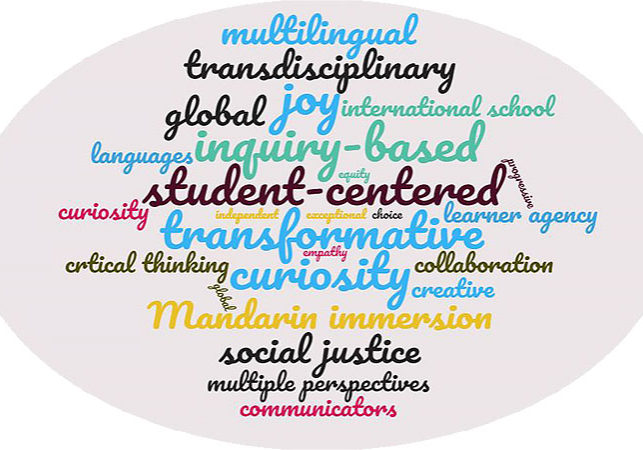Why Should I Choose an International School?
Posted in Events
What makes a school an “international” school? The major difference between an international school and a private or traditional public school is the curriculum or framework of learning. Students at an international school will be using an international curriculum–one that is steeped in global best practices as opposed to any one region or any one school of thought. In addition, international schools often place high value on international mindedness-the connected world and our shared sense of responsibility for the earth and each other) and will have an emphasis on multilingualism.
The International Baccalaureate
The International Baccalaureate (IB) is a great example of an international framework of learning and one that many international schools utilize. The IB is an organization which started in the 1960’s influenced by progressive educational thought that championed curiosity, whole child education and student voice in the learning process. Students engaged in an IB program (which starts at 3 years old and continues through to high school graduation) learn to inquire into their learning–asking questions, looking at issues through multiple perspectives and then taking action with the knowledge that they acquired. All IB students are also learning a second (sometimes third or more) language as well. This endeavor is to “develop inquiring, knowledgeable and caring young people who help to create a better and more peaceful world through intercultural understanding and respect,” (IBO Mission Statement).
The classroom: inquiry drives the curriculum
An IB classroom is one that is equally structured as it is flexible. Learning is conducted in Units of Inquiries (UOI) allowing students to inquire deeply into a topic of significance. As opposed to subject-based learning (40 minute blocks of one subject such as math, reading, science, etc), inquiry-based learning guides students to dive deeply into transdisciplinary units, such as, “A marketplace serves the needs and wants of a community in different ways,” and “Climate impacts human development.” Students start by asking questions, sharing in experiences to drive their curiosity, and then are asked to research into how these topics are articulated in the world around them and then encouraged to take action to facilitate change in their communities. It is an incredibly powerful way to learn!
The community: families from diverse backgrounds
Honoring multiple perspectives often translates to a very inclusive, warm and welcoming community at an international school. Many families who enroll in international schools have had extensive experience traveling, living abroad and/or have a commitment to developing global perspectives and multilingual learning. These families have a common mentality that the world is evolving and that their children must be prepared to exercise creativity and critical thinking skills with compassion in order to facilitate change in their communities. Many of the faculty in international school also have extensive experience teaching abroad and have a shared perspective that education is the vehicle to which the world will be made a better place.
The benefits: joyful learning
An international school environment inherently fosters individualized learning due to the focus on student’s understanding and appreciating multiple perspectives. A student’s natural curiosities and opinions are valued–and they are encouraged to actively listen, seek knowledge and act compassionately of others whose opinion may differ than their own. In addition, international schools often have smaller class sizes (many are private schools) thus empowering the teachers to provide individualized learning to meet each and every student’s needs. A strong relationship is fostered between student/teacher as well as between peers cultivating a sense of shared responsibility for a community. This is especially important for language immersion—students in immersion settings will need multiple opportunities to express their learning which happens best in small,intimate classroom settings where students can understand the power of relationships versus simply memorizing words and completing worksheets. This cohesive and intentional school environment allows a student to feel valued, gives them confidence to take risks and brings joy into the learning process.
Shu Ren International School located in Berkeley, CA is an IB school and Mandarin immersion and one of the first international schools established in the region. Connect with us here in order to find out our unique approach to international education.
